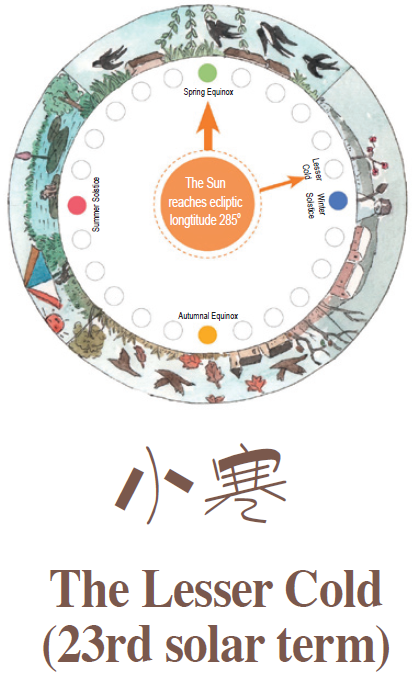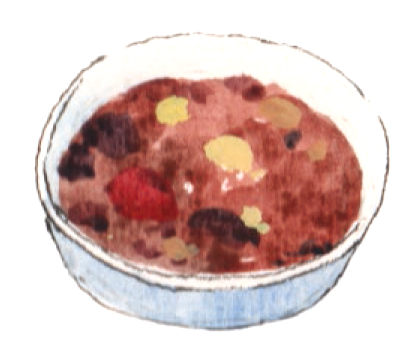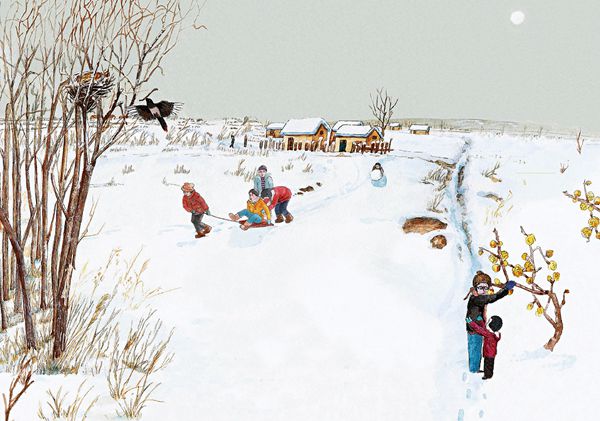On December 1, 2016, the Twenty-Four Solar Terms were officially listed as UNESCO Intangible Cultural Heritage. Hailed as the fifth great invention of China, the 24 terms are the points on traditional East Asian lunisolar calendars that match particular astronomical events or signify certain natural phenomena.
Observed over millennia by Chinese ancients and synchronized with the seasons, these terms are integral to agrarian societies. Under their guidance, farmers know when to sow, when to irrigate, and when to harvest. The specific rituals and festivals associated with these terms have contributed to their cultural significance in Chinese society.
There are two solar terms in each month of the Gregorian calendar. This year, we will introduce them all as they occur. The month of January encompasses the Lesser Cold (the 23rd solar term) and the Greater Cold (the 24th and last solar term).
The Lesser Cold (23rd solar term)
The Lesser Cold (小寒), 23rd of the 24 solar terms, falls between January 5 and 7 of the Gregorian calendar, and this year is on January 5. It ushers in the coldest days of the year. According to meteorological data, of all 24 solar terms it is during this one, the 23rd, that temperatures are lowest. Contrary to what their names suggest, there have been few years when the weather has been colder in the Greater Cold (大寒) than during the Lesser Cold.

There is a Chinese saying, “The coldest days are during the third Nine” – meaning a nine-day period during Lesser Cold. In this solar term, cold air masses moving from north to south cause temperatures to drop so low that both the soil and lakes throughout northern China freeze. As icy temperatures pose the risk of frost for winter crops, farmers take care to shake snow off the branches of their fruit trees after a snowfall to prevent them from freezing and breaking off.
People also need to “shake off” excess cold from their bodies. Traditional Chinese medicine defines cold in the human body as yin, and the coldest period of the year is notable for excessive yin that upsets the essential yin and yang balance. So to maintain good health during the Lesser Cold, close attention must be paid to diet. As piping hot food is recommended to ward off freezing temperatures, hotpot is the perfect dish!

The Laba Festival, a main event during the Lesser Cold, is an event specifically to serve this purpose. On the 8th day of layue, the twelfth month of the lunar year, every household cooks laba porridge (腊八粥), which includes nuts and dried fruit. The famous Ming Dynasty pharmacologist Li Shizhen states in his Compendium of Materia Medica (1590) that rice porridge reinforces qi (the life force), helps generate saliva, and nourishes the spleen and stomach. It is hence the perfect remedy for excess cold within the human body.
In certain areas people make laba garlic, by steeping garlic cloves in vinegar. In Beijing, the Yonghegong Lama Temple is the most popular rice porridge eaterie. Every year, thousands of local people journey there on this day to enjoy a bowl of steaming hot porridge, in hopes that it will bring good luck and happiness in the coming year, as well as good cheer. People in southern China’s Guangdong Province traditionally cook and enjoy glutinous rice for breakfast on this day, adding to it bacon rashers, sliced sausage, peanuts, and green onions.

There are also many legends about the origins of the Laba Festival. Some say it was the day when Sakyamuni became Buddha, others say it is to commemorate Yue Fei, the Southern Song Dynasty general famous in Chinese history.
But, there’s no need to sit indoors bored when the Lesser Cold comes! One aesthetic advantage of such severe winters is the annual Ice Sculpture Festival in Harbin. This traditional festival is a chance to experience and marvel at a wonderland of ice art, and attracts thousands of visitors each year.
(Compiled by China Today based on The Twenty-Four Solar Terms Published by Dolphin Books)



